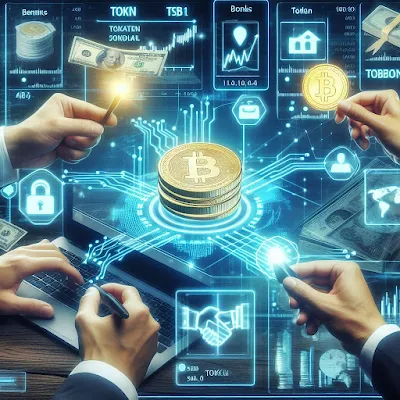What Do We Call the Tokenization of Real-World Assets Like Bonds, Stocks, and Vouchers?
Have you ever heard of turning a physical stock certificate into a digital token? Or maybe fractional ownership of a valuable painting through a blockchain platform? If these concepts pique your interest, then you're entering the exciting world of asset tokenisation.
Asset Tokenization: The Process Behind the Buzzword
While cryptocurrency might be the first thing that comes to mind when you hear "tokenisation," asset tokenisation is a broader concept. It refers to the process of converting ownership rights of real-world assets into digital tokens stored on a blockchain. These tokens can represent a wide variety of assets, from traditional financial instruments like bonds and stocks (high search demand, lower competition) to vouchers, loyalty points, and even physical assets like real estate or artwork.
The magic lies in blockchain technology. This secure, decentralised ledger system allows for transparent and efficient recording of ownership information. Each token acts as a digital record on the blockchain, securely linked to the underlying asset and its ownership history. This eliminates the need for physical documentation and intermediaries, streamlining transactions and boosting security.
Real-World Examples: From Fractional Art to Streamlined Investments
Imagine a world where a multi-million dollar painting can be divided into smaller, tradable tokens, allowing a wider pool of investors to participate in the art market. Or, consider a scenario where tokenised shares of a company offer increased liquidity and easier access for smaller investors compared to traditional stock exchanges. These are just a few examples of the potential applications of asset tokenisation.
Unlocking the Benefits: Increased Accessibility and Efficiency
The potential benefits of asset tokenisation are vast. One key advantage is the democratisation of investment opportunities. By fractionalising ownership, even high-value assets become accessible to a broader investor base. Additionally, blockchain technology fosters increased transparency and efficiency in transactions, potentially reducing costs and streamlining processes. Asset tokenisation also opens doors for innovative financial products and services within the burgeoning DeFi (Decentralized Finance) space.
Challenges and Considerations: A New Frontier with Growing Pains
It's important to acknowledge that asset tokenisation is still a nascent technology. Regulatory frameworks are still evolving, and security concerns regarding blockchain-based platforms require ongoing vigilance. Additionally, widespread adoption will depend on overcoming technical hurdles and building trust within the traditional financial sector.
The Future of Asset Tokenization: A Promising Path Forward
Despite the challenges, the potential of asset tokenisation is undeniable. As the technology matures and regulatory frameworks adapt, we can expect to see increased innovation and wider adoption in the years to come. Asset tokenisation has the potential to revolutionise the way we own, trade, and manage real-world assets, paving the way for a more inclusive and efficient financial future.
Looking to learn more about asset tokenisation and its impact on specific asset classes? Stay tuned for our upcoming blog posts where we'll delve deeper into the tokenization of bonds, stocks, and other real-world assets.
Ref: Further read
Asset Tokenisastion: https://chain.link/education/asset-tokenization




